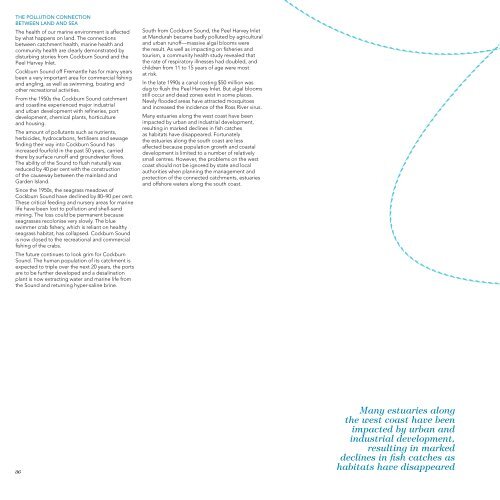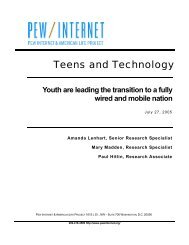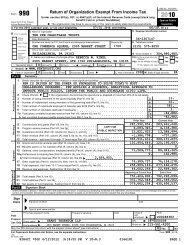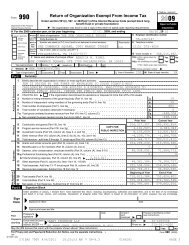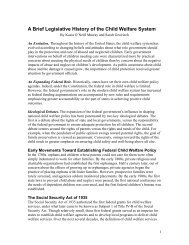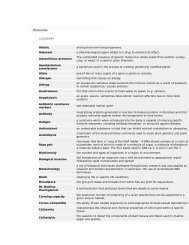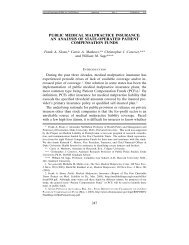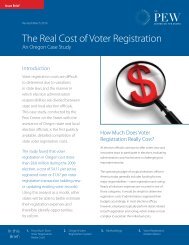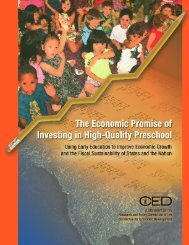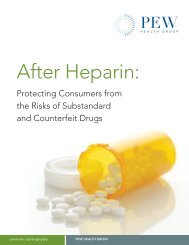Protecting Western Australia's Big Blue Backyard - The Pew ...
Protecting Western Australia's Big Blue Backyard - The Pew ...
Protecting Western Australia's Big Blue Backyard - The Pew ...
Create successful ePaper yourself
Turn your PDF publications into a flip-book with our unique Google optimized e-Paper software.
THE POLLUTION CONNECTION<br />
BETWEEN LAND AND SEA<br />
<strong>The</strong> health of our marine environment is affected<br />
by what happens on land. <strong>The</strong> connections<br />
between catchment health, marine health and<br />
community health are clearly demonstrated by<br />
disturbing stories from Cockburn Sound and the<br />
Peel Harvey Inlet.<br />
Cockburn Sound off Fremantle has for many years<br />
been a very important area for commercial fishing<br />
and angling, as well as swimming, boating and<br />
other recreational activities.<br />
From the 1950s the Cockburn Sound catchment<br />
and coastline experienced major industrial<br />
and urban development with refineries, port<br />
development, chemical plants, horticulture<br />
and housing.<br />
<strong>The</strong> amount of pollutants such as nutrients,<br />
herbicides, hydrocarbons, fertilisers and sewage<br />
finding their way into Cockburn Sound has<br />
increased fourfold in the past 50 years, carried<br />
there by surface runoff and groundwater flows.<br />
<strong>The</strong> ability of the Sound to flush naturally was<br />
reduced by 40 per cent with the construction<br />
of the causeway between the mainland and<br />
Garden Island.<br />
Since the 1950s, the seagrass meadows of<br />
Cockburn Sound have declined by 80–90 per cent.<br />
<strong>The</strong>se critical feeding and nursery areas for marine<br />
life have been lost to pollution and shell-sand<br />
mining. <strong>The</strong> loss could be permanent because<br />
seagrasses recolonise very slowly. <strong>The</strong> blue<br />
swimmer crab fishery, which is reliant on healthy<br />
seagrass habitat, has collapsed. Cockburn Sound<br />
is now closed to the recreational and commercial<br />
fishing of the crabs.<br />
<strong>The</strong> future continues to look grim for Cockburn<br />
Sound. <strong>The</strong> human population of its catchment is<br />
expected to triple over the next 20 years, the ports<br />
are to be further developed and a desalination<br />
plant is now extracting water and marine life from<br />
the Sound and returning hyper-saline brine.<br />
South from Cockburn Sound, the Peel Harvey Inlet<br />
at Mandurah became badly polluted by agricultural<br />
and urban runoff—massive algal blooms were<br />
the result. As well as impacting on fisheries and<br />
tourism, a community health study revealed that<br />
the rate of respiratory illnesses had doubled, and<br />
children from 11 to 15 years of age were most<br />
at risk.<br />
In the late 1990s a canal costing $50 million was<br />
dug to flush the Peel Harvey Inlet. But algal blooms<br />
still occur and dead zones exist in some places.<br />
Newly flooded areas have attracted mosquitoes<br />
and increased the incidence of the Ross River virus.<br />
Many estuaries along the west coast have been<br />
impacted by urban and industrial development,<br />
resulting in marked declines in fish catches<br />
as habitats have disappeared. Fortunately<br />
the estuaries along the south coast are less<br />
affected because population growth and coastal<br />
development is limited to a number of relatively<br />
small centres. However, the problems on the west<br />
coast should not be ignored by state and local<br />
authorities when planning the management and<br />
protection of the connected catchments, estuaries<br />
and offshore waters along the south coast.<br />
Light penetrates more deeply in<br />
the region’s clear waters, allowing<br />
extensive and globally significant<br />
seagrass meadows to grow at<br />
depths greater than usual<br />
© Glen Cowans<br />
36<br />
Many estuaries along<br />
the west coast have been<br />
impacted by urban and<br />
industrial development,<br />
resulting in marked<br />
declines in fish catches as<br />
habitats have disappeared


